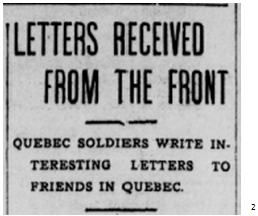Saturday, July 17, 1915
Trenches – Ploegsteert
The Battalion War Diarist wrote nothing for this day: [1]
THIS DAY IN RMR HISTORY:
“Canadian Expeditionary Force
France, June 23, 1915
Dear Mike: How is the world using you? Are you still setting up those old milling machines? I hear they are assembling machine guns at the Ross. Send them along, we need them all for it is pretty hot over here. One off our bunch was killed yesterday, and that makes it only about ten of the old 8th R.R. boys left in our battalion. With all that, we are there with our little steel line and there is ‘some class’ to our old Ross. We make it a point to never miss a Hun; it is so nice to see them fall. We show no mercy for they give us none.
A soon as we came into the trenches they called over to us:- ‘Come on Canadians and show us how the Ross rifle can shoot.’
They found out very soon and asked us if we had any jam. We sent them a few jars in the shape of hand grenades, which caused no end of destruction. We did not hear from them after that.
Tell all the boys and girls I was asking for them, and as soon as you get this letter drop me a line and let me know how things are going in old Quebec.
Hoping to hear from you soon. Your old pal,
Corpl. James Halligan
No. 4 Co., 14th Battalion” [3]
 Corporal James Christopher Halligan, No. 22873: James Christopher Halligan was born in Montreal on March 16th, 1891, but resided at Quebec City, where he worked as a gunsmith when he enlisted August 6th 1914 for overseas service with the 12th Battalion, C.E.F. at the outbreak of the war. His attestation paper dated September 29th, 1914 says he had previously served with the 8th Regiment “Royal Rifles” of Quebec City. He proceeded overseas with the 12th Battalion when it embarked for Britain on 30 September 1914. The 12th Bn. was then re-designated the 12th Reserve Infantry Battalion, CEF on 29 April 1915, to provide reinforcements for the Canadian Corps in the field. As part of the dispersal, Halligan passed through the 23rd Reserve Bn. and was then posted to the 14th Battalion on May 23rd 1916. There he served until receiving minor gun-shot wounds to the head and hand July 17th 1916. After being treated in military hospitals in France and England he then served with the Canadian Military Police in both France and England until the end of the war. He received his discharge at Halifax, N.S., on May 7, 1919 upon general demobilization. Nothing is known of Halligan’s life after the war, except that his records show he died at Cronulla, a suburb of Sydney, New South Wales, Australia on May 16, 1969.
Corporal James Christopher Halligan, No. 22873: James Christopher Halligan was born in Montreal on March 16th, 1891, but resided at Quebec City, where he worked as a gunsmith when he enlisted August 6th 1914 for overseas service with the 12th Battalion, C.E.F. at the outbreak of the war. His attestation paper dated September 29th, 1914 says he had previously served with the 8th Regiment “Royal Rifles” of Quebec City. He proceeded overseas with the 12th Battalion when it embarked for Britain on 30 September 1914. The 12th Bn. was then re-designated the 12th Reserve Infantry Battalion, CEF on 29 April 1915, to provide reinforcements for the Canadian Corps in the field. As part of the dispersal, Halligan passed through the 23rd Reserve Bn. and was then posted to the 14th Battalion on May 23rd 1916. There he served until receiving minor gun-shot wounds to the head and hand July 17th 1916. After being treated in military hospitals in France and England he then served with the Canadian Military Police in both France and England until the end of the war. He received his discharge at Halifax, N.S., on May 7, 1919 upon general demobilization. Nothing is known of Halligan’s life after the war, except that his records show he died at Cronulla, a suburb of Sydney, New South Wales, Australia on May 16, 1969.
[1] War Diary, 14th Canadian Battalion, The Royal Montreal Regiment, July 17, 1915. Library and Archives Canada, Ottawa http://data2.collectionscanada.ca/e/e044/e001089763.jpg
[2] “Letters Received From The Front,” The Quebec Chronicle, Quebec, Monday, July 12, 1915, pg. 5 col. 4.
[3] Ibid

